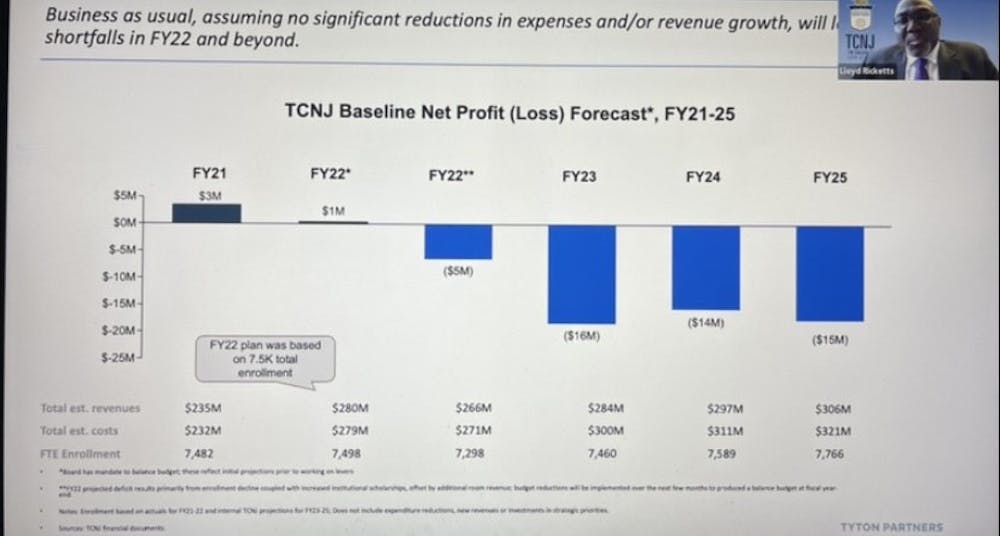By Myara Gomez
Staff Writer
The Strategy Working Group hosted a Zoom meeting on Feb. 8 to discuss the College’s finances and staffing shortages on campus. Concerns were voiced regarding how these plans are going to actually work.
Vice President and Treasurer Lloyd Ricketts spoke about the financial situation of the College, noting that the community needs to make alterations to their distributions of finances to be able to run properly.
“There’s a consensus being built that business as usual is not sustainable from a financial standpoint,” Ricketts said. “So, what this slide does is that it crystallizes that point that we need to wrestle with the challenges, financial challenges that we are facing in order to make some strategic investments and preserve the sworn mission of the institution.
Ricketts suggests that increasing acceptances could possibly increase revenues to improve the current financial standing of the College.
“The idea is to grow TCNJ to somewhere between seven and a half thousand to eight thousand undergraduate students. This was not a decision that the Strategy Working Group made lightly and we recognize that there are some significant concerns to this. There’s a possible damage to our brand and reputation,” said David Blake, the chair of the Strategy Working Group and professor of English at the College.
Blake also mentioned the concern that their plan to increase the amount of undergraduate students could affect graduation rates.
Lily Collins, a freshman secondary special education and history major, raises the concern that if the College were to increase the amount of undergraduate students, this also raises the concern of how on-campus housing will be affected.
“I think it is a reasonable idea to admit more students,” said Collins. “The only concern would be if there is enough housing and if that would in turn cost more money for building new dorms. Another concern is if it would change their acceptance rate and the competition of the academics here.”
But the College is not concerned about building new dorms or housing.
“In the end, the financial benefits of adopting a gross strategy were too convincing, while this was not a unanimous decision by everyone on the Strategy Working Group, it certainly was decided by an overwhelming majority,” said Blake.
Rachel Guloy, sophomore psychology major, believes the financial benefits are a considering factor, but staff at the College could be significantly overwhelmed with an overflowing workload placed on them if more students are admitted.
“I don’t know the strain that this would put on our school facilities, since [it is] already really understaffed at Eick and Traditions, and probably more that I’m not completely aware of,” said Guloy.
The College is currently attempting to work out all of the uncertainties in its planning process to ensure a positive result that would help the College’s community.
“As we navigate and make changes in this changing shifting landscape, we don’t want to lose sight of what we value as an institution,” said Winnifred Brown-Glaude, professor of African American studies, sociology and anthropology.
The College is still in the planning stage of its idea process and the Strategy Working Group has high expectations for the decisions that were made. The next presentation from the Strategy Working Group will be in March, where students will be able to attend and listen to the presentation and proposed plans.







